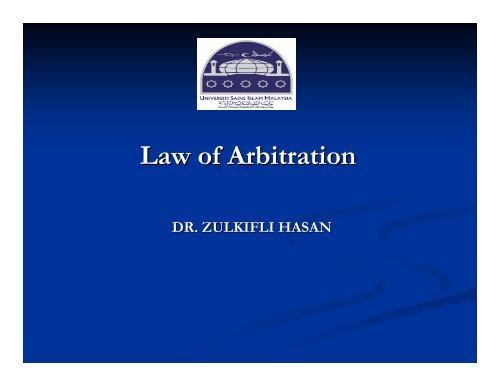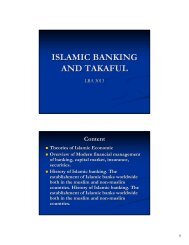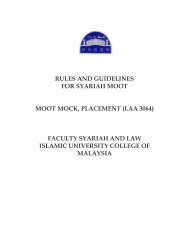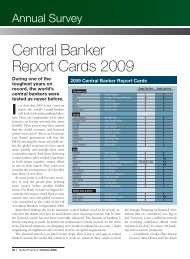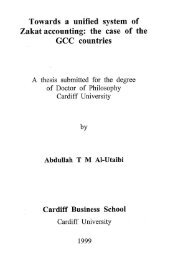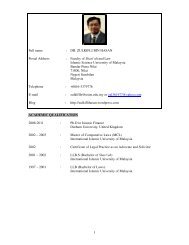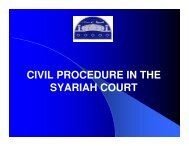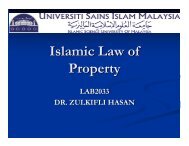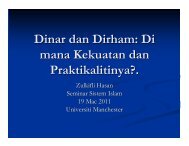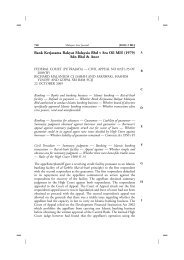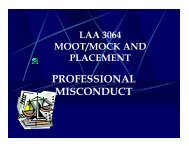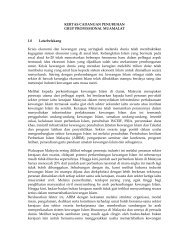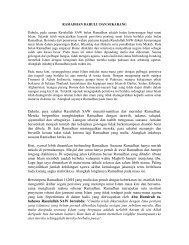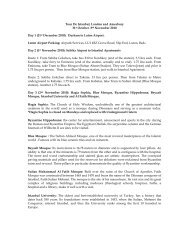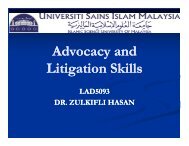Cost and Fees
Cost and Fees
Cost and Fees
- No tags were found...
You also want an ePaper? Increase the reach of your titles
YUMPU automatically turns print PDFs into web optimized ePapers that Google loves.
Law of Arbitration<br />
DR. ZULKIFLI HASAN
Content<br />
<strong>Cost</strong><br />
<strong>Fees</strong><br />
Taxation<br />
Interest<br />
Remission<br />
Setting aside
COSTS<br />
<strong>Cost</strong>s of legal advice <strong>and</strong><br />
representation, the arbitrator fees, the<br />
costs of evidence, costs of<br />
accommodation <strong>and</strong> administrative<br />
support during the arbitration<br />
proceedings <strong>and</strong> other expenses<br />
incurred in connection with the<br />
reference.<br />
It does not refer to the substantive<br />
amount claimed in a reference to<br />
arbitration.
Types of <strong>Cost</strong>s<br />
1. The arbitrator’s s fees <strong>and</strong> expenses<br />
2. The fees <strong>and</strong> expenses of any arbitral<br />
institution involved<br />
3. The parties’ own costs including legal costs<br />
<strong>and</strong> fees of counsel of rep<br />
4. Any costs incidental to the arbitration. Eg fees<br />
of experts, translators, photocopying, hiring of<br />
premises.
TERMS USED IN ARBITRATION<br />
ACT 2005<br />
<strong>Cost</strong>s <strong>and</strong> expenses of arbitration<br />
<strong>Cost</strong>s – eg. . Arbitrator fees,<br />
Expenses – eg. travelling,<br />
photocopying, hiring of premises
COSTS OF THE REFERENCE<br />
AND COSTS OF THE AWARD<br />
<strong>Cost</strong>s of the<br />
reference<br />
Those which the<br />
parties<br />
reasonably<br />
incur in prosecuting<br />
the claims made or<br />
in<br />
defending<br />
against them<br />
Item 3<br />
<strong>Cost</strong>s of the Award<br />
Arbitrators fees <strong>and</strong><br />
proper expenses<br />
incurred in the<br />
arbitration process<br />
Item 1, 2 <strong>and</strong> 4.
SECTION 44<br />
Parties to a reference are in general at<br />
liberty to agree who shall pay the costs<br />
(reflected in S. 44 (1) )<br />
S. 44 (1) (a) arbitral tribunal has<br />
discretion to<br />
i)Direct to <strong>and</strong> by whom <strong>and</strong> in what<br />
manner those costs or any part thereof<br />
shall be paid<br />
ii)Tax or settle the amount of such costs<br />
<strong>and</strong> expenses<br />
iii)Award such costs <strong>and</strong> expenses to be<br />
paid
DISCRETION OF ARBITRAL<br />
TRIBUNAL<br />
Arbitral tribunal has discretion to<br />
order costs + interest (award interest<br />
<strong>and</strong> determined the rate of interest )<br />
It has to be exercised judiciously<br />
The arbitral tribunal must state<br />
reasons for awarding the costs
Arbitrator is Empowered to make an award of costs<br />
Re Stephen, Smith <strong>and</strong> Co <strong>and</strong> Liverpool <strong>and</strong> London <strong>and</strong> Globe<br />
Insurance Co [1892] 36 Sol Jo 464<br />
The effect of the clause is to make arbitrators <strong>and</strong> umpires judges<br />
in their own cause <strong>and</strong> to allow them to settle finally the amount<br />
of costs to be paid to them.<br />
Must not take into account: prejudice of race, religion or<br />
sympathy with the unsuccessful party.<br />
The exercise of this power must be in the form of an<br />
award.<br />
The arbitrator must specify<br />
the party entitled to costs<br />
Who shall pay<br />
The amount<br />
Method of determining that amount<br />
Manner in which the cost shall be paid
<strong>Cost</strong><br />
<br />
<br />
<br />
<br />
<br />
<br />
The complexity of the cause or matter <strong>and</strong> the<br />
difficulty or novelty of the questions involved<br />
The skill, specialised knowledge <strong>and</strong> responsibility<br />
required of, <strong>and</strong> the time <strong>and</strong> labour expended<br />
The number <strong>and</strong> importance of the documents<br />
(however brief) prepared or perused<br />
The place <strong>and</strong> circumstances in which the business<br />
involved is transacted<br />
The urgency <strong>and</strong> importance of the cause or matter to<br />
the client<br />
Where money or property is involved, its amount or<br />
value
<strong>Cost</strong>s Prima Facie to follow the event<br />
costs of an action are usually awarded<br />
to the successful litigant.<br />
The party who requires to submit to<br />
arbitration in order to achieve that to which he<br />
is entitled should recover his costs incurred in<br />
so doing from the other party. The loser pays.<br />
Smeaton, Hanscomb & Co Ltd v Sassoon<br />
Setty, , Sons & Co (No. 2)<br />
<br />
Prima facie, a successful party is entitled to<br />
costs. Not entitled at law but merely prima<br />
facie entitled.
Exception<br />
(i) <strong>Cost</strong>s thrown away<br />
eg: : failing to comply with a discretion,<br />
failing to appear, cause delay in<br />
proceedings.<br />
ii) Adjournments or cancellations<br />
a) Failure of a successful party to accept<br />
an offer made earlier by the other<br />
party<br />
b) extravagance, such as using too many<br />
counsels or expert witnesses <strong>and</strong> the<br />
like<br />
c) Causing a large amount of time ( or<br />
costs) involved
the arbitrator may normally retain his<br />
award until such fees or remuneration<br />
is paid to him.<br />
however, by virtue of S.44 (4), the HC<br />
may order the arbitral tribunal to<br />
deliver the award on such conditions as<br />
the HC thinks fit
Award without specifying the costs<br />
S 44 (b): Apply to the HC for the costs to be<br />
taxed if the arbitrator fails to specify the amount<br />
of costs within 30 days of having been requested<br />
to do so.
Award without costs<br />
Williams v Wilson [1853] LR 9 Ex 90<br />
If the arbitrator has not included costs in his<br />
award, it is assumed that each party to bear his<br />
own costs<br />
S 44 (c): Each party shall be responsible for its<br />
own legal <strong>and</strong> other expenses .
INTEREST ON THE AWARD<br />
the court will not interfere with the<br />
tribunals exercise of its discretion to<br />
award costs merely because the court<br />
would itself exercised that discretion<br />
differently
y virtue of S. 33(6), interest is<br />
payable from the date on which<br />
the award is made<br />
S.33 (6) – unless otherwise<br />
provided by the arbitration<br />
agreement, the arbitral tribunal<br />
may –<br />
a)Award interest on any sum of<br />
money ordered to be paid by the<br />
award from the date of the<br />
award to the date of realisation<br />
b)Determine the rate of interest
the rate of the interest would be the<br />
same as that of judgment debt<br />
The interest would accrue unless the<br />
award otherwise states<br />
The arbitral tribunal may award<br />
interest from the date of the award.<br />
This power is inherent in an arbitrator<br />
by virtue of his implied powers which<br />
he may exercise unless there is a<br />
valid objection against it
APPLICATION TO SET ASIDE<br />
OF AN AWARD<br />
S. 37 (1) (a) the party who apply to set<br />
aside the award must provide proof<br />
that:<br />
i)A A party to the arbitration agreement<br />
was under incapacity<br />
ii) arbitration agreement is not valid<br />
under the law which the parties have<br />
subjected it
iii) the party making the application<br />
was not given proper notice of<br />
appointment of an arbitrator / arbitral<br />
proceedings/ unable to present that<br />
party’s s case<br />
iv) The award deals with a dispute not<br />
contemplated /not falling within the<br />
terms of the submission to arbitration<br />
v) Award contains decisions on matters<br />
beyond the scope of submission to<br />
arbitration
vi) Composition of the arbitral tribunal<br />
/arbitral procedure was not in<br />
accordance with the arbitration<br />
agreement<br />
b) the HC finds that<br />
i)Subject matter of the dispute is not<br />
capable of settlement by arbitration<br />
under the laws of Malaysia; or<br />
ii) The award is in conflict with the<br />
public policy of Malaysia
What is meant by in conflict with the<br />
public policy of Malaysia<br />
(S. 37(2) )<br />
a) The making of the award was<br />
induced or affected by fraud or<br />
corruption<br />
Fraud<br />
Court consider fraud as something<br />
which is in conflict with the public<br />
policy of Malaysia<br />
It is part of misconduct of arbitrator
Case: Haigh v Haigh [1861] 31 LJ Ch 420<br />
“Arbitrators like other judges are bound,<br />
when they are not expressly absolved<br />
from doing so, to observe in their<br />
proceedings the ordinary rules which are<br />
laid down for the administration of<br />
justice, <strong>and</strong> the court when called upon<br />
to review their proceedings, is bound to<br />
see those rules have been observed”
a) A breach of natural justice occurred<br />
i) During the arbitral proceedings<br />
ii)<br />
In connection with the making of<br />
the award
Other situations in which an award<br />
is set aside<br />
i)No choice except to set aside<br />
The award would have to be set<br />
aside where the only conclusion to<br />
which the court can arrive is to set<br />
aside the award<br />
Eg: : when the contract is illegal
ii) Where arbitrator is biased<br />
The court would also set aside an<br />
award where the arbitrator has<br />
misconducted himself by favouring<br />
one party over the other / fails to<br />
reconsider the award impartially<br />
iii) Award being excessive<br />
an award which is manifestly<br />
excessive may be set aside
iv) Mistake or error apparent on the<br />
face of the award<br />
Case:<br />
Pegang<br />
Prospecting<br />
Co.Ind<br />
(1967) MLJ 231<br />
The arbitrator in this case refused to<br />
accept certain question of law. . It was<br />
held that the award should be set aside<br />
as the arbitrator may have decided<br />
certain questions of law
EFFECT OF SETTING ASIDE AN<br />
AWARD<br />
<br />
it becomes devoid of any legal effect<br />
( as if it had never existed before)<br />
the purpose of setting aside the<br />
award is to prevent the original<br />
arbitrators from hearing the case<br />
again<br />
Once the award is set aside, the<br />
arbitrator becomes functus officio<br />
(having discharged his duty )
REFERENCE ON QUESTION OF<br />
LAW<br />
An award could also be set aside if a party<br />
refer to the HC any question of law which<br />
arise from an award (S. 42)<br />
S. 42(4) The HC may on the determination<br />
of a reference –<br />
a) Confirm the award<br />
b) Vary the award<br />
c) Remit the award<br />
d) Set aside the award (in whole or in part)
REMISSION<br />
<br />
send back for reconsideration<br />
Simply means that the court is asking<br />
the arbitrator to make a fresh award<br />
on some or all of the issues under<br />
arbitration<br />
The power to remit an award is<br />
limited only to matters which relate<br />
to question of law arising out of an<br />
award
DISTINCTION BETWEEN<br />
REMISSION AND SETTING ASIDE<br />
REMISSION<br />
The door for<br />
arbitration is not<br />
completely closed.<br />
Arbitrator could<br />
rectify the mistakes<br />
he might have<br />
committed earlier<br />
SETTING ASIDE<br />
The whole award<br />
becomes null <strong>and</strong> void


